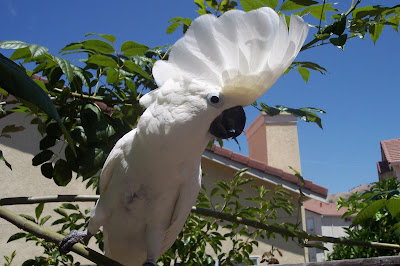Umbrella Cockatoo
Umbrella Cockatoo
The umbrella cockatoo, also known as the white cockatoo or the great white-crested cockatoo, is well-known in bird circles as being one of the most affectionate and affable companion birds widely available on the market today. An Indonesian native, the umbrella is slightly smaller than the Moluccan cockatoo, but is not smaller in personality or charm. This out-going cockatoo is infamous for its outlandish antics and for being clingy with its owners.
The umbrella can be distinguished from other white cockatoos by its wholly white crest that raises like an umbrella when the bird is excited, agitated, or ready to play (or bite!). Both the beak and legs are a dark gray, and the feathers on the undersides of the wings and tail are light yellow.
Native Region / Natural Habitat
The umbrella cockatoo is native to the islands of Indonesia, where it lives in tropical rainforest.
Personality & Behavior
The umbrella cockatoo certainly makes a charming, affectionate pet, but it’s not for everyone. This bird can be as fickle as the weather, playing one minute and screaming and nipping the next. Birds will be birds, with all of their quirks and caprices, and umbrellas are no exception, though the informed umbrella owner is fortunate to live with this extraordinary bird that was named after something ordinary—and indispensable.
The umbrella desires nothing more than to cuddle with the object of its desire, and can become overly attached to other birds or objects in the pet shop, leading to serious disappointment when these birds or objects are sold—these birds are extremely sentimental! In the wild, the umbrella is never without a companion, and the captive umbrella has the same instinctual patterning to bond to a mate, or at least to have a special friend. The best way to make an umbrella cockatoo unhappy is to keep it in isolation.
Speech & Sounds
The noise level of this bird is extremely high. It is prone to bouts of loud screaming, especially if it is isolated, locked in a cage, or doesn’t get its way. Screaming is often a measure of the bird’s displeasure—the louder the more significant the disapproval of its circumstances. Many cockatoos are re-homed because of their superior voices. On the up side, the umbrella can be taught to talk and may acquire a vocabulary of more than 50 words, though most will not learn that many. Often, a bird that learns to talk may substitute screaming for talking—but not all of the time.
Care & Feeding
The umbrella cockatoo is a long-term commitment for an owner—this species can live up to 70 years with proper care and attention. Unfortunately, many of these sensitive birds don’t live that long. They are prone to self-mutilation and the infections that result from that abnormal behavior.
Because this bird is large and hates being confined to the point of chewing and picking out its feathers, it requires a large space to live in, preferably an enormous, well-build cage with a top that opens into a playstand. An umbrella can’t live happily in a small space, and will become weary and apathetic or agitated and aggressive if confined.
The umbrella cockatoo owner should have experience with parrots before taking on this feathered handful. This is not a good first bird, nor is a good child’s pet. The umbrella also tends to become spoiled very easily, and will not take well to changes in routine, or additions to the family, such as an infant or new puppy.
Food for cockatoos should be nutritious, but should also include a foraging element as well. Cockatoos are fun-loving, intelligent and energetic parrots, and their food should reflect those traits. Wild cockatoos forage all day for seeds and nuts, as well as coconuts and grain crops. Like all companion parrots, cockatoos do not thrive on birdseed alone. Cockatoo food shouldn’t be boring to eat, either, and will love foods like Avi-Cakes, Nutri-Meals, Pellet-Berries, Nutri-Berries, and Lafeber’s Premium Daily Diet Pellets.
Another serious consideration for a new owner is the powder dust that these cockatoos emit, which can irritate those owners with sensitive respiratory systems or allergies. Use air purifiers if you have room for them, as these items help to cut down on the dust. Regular bathing with clear, warm water will also help.
Health & Common Conditions
Umbrella cockatoos are prone to picking at or pulling out their feathers is not offered sufficient mental stimulation. Other diseases/conditions found in cockatoos include psittacine beak and feather disease (PBFD), fatty liver disease and obesity if fed a diet too high in fat.
Get an Umbrella Cockatoo
Umbrella cockatoos are available from avian-only retail stores, from bird breeders and are also available for adoption from avian rescue organizations. This is a bird for an experienced bird owner who can meet the bird’s housing and emotional needs. Ideally, a new cockatoo owner should work with an experienced cockatoo breeder and/or avian behaviorist early on to set a cockatoo up for success as a companion pet.







Comments
Post a Comment